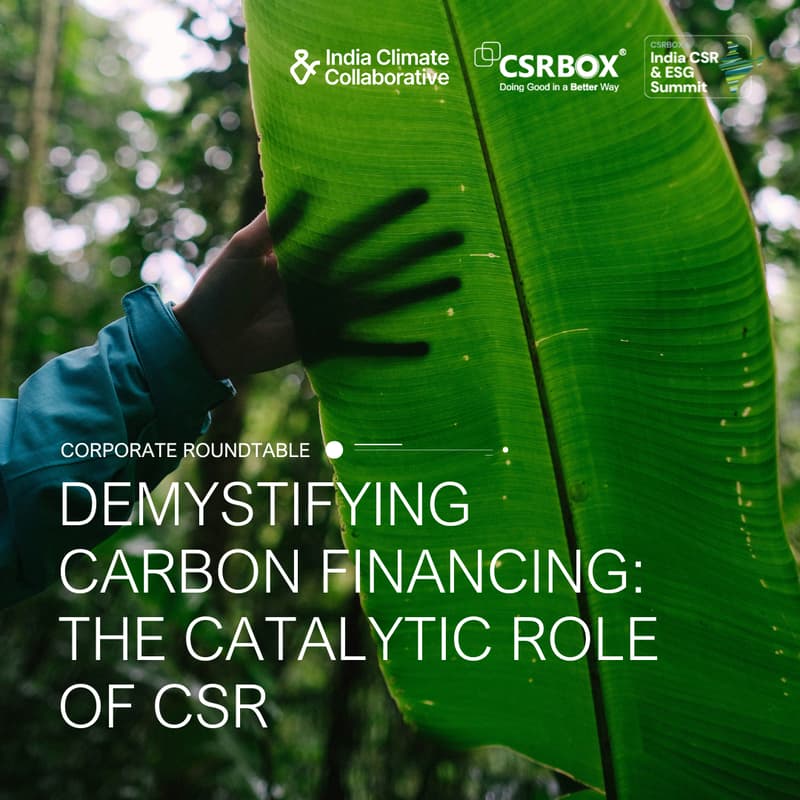

Demystifying Carbon Financing: The Catalytic Role of CSR
The Corporate Roundtable organised by the India Climate Collaborative in partnership with CSRBOX, will be held as part of the 12th Edition of the India CSR & ESG Summit, on October 8th, 2025, at Hotel Pullman, New Delhi.
Background
As India advances its commitment towards net zero and sustainable development, carbon financing is emerging as a pivotal instrument to drive finance while balancing socio-economic growth. India’s carbon finance market surged to over USD 1.2 billion in 2023 and is forecast to grow to USD 10 billion or more by 2030, reflecting a rapid CAGR of 38–43 %.[1] Between 2010 and 2022 alone, Indian entities issued over 278 million carbon credits, or around 17 % of the global voluntary market supply.[2]
The groundwork for carbon financing (including carbon markets and non-market approaches) was laid out at COP26 in Glasgow. Article 6.4 of the Paris Agreement establishes a new UNFCCC mechanism which can be used to trade high-quality carbon credits. Government push is building too, and with India launching its national carbon market framework, there is a growing imperative for businesses to understand how carbon credits can be integrated responsibly into their decarbonisation strategies. This includes navigating policy nuances, ensuring project credibility, and aligning investments with broader climate and development goals.
According to the latest reports by Deloitte, India will need USD 1.5 trillion across sectors like renewable energy, decarbonisation, sustainable infrastructure, and energy storage by 2030.[3] Carbon finance can play a pivotal role, and corporates will have a monumental role to play. For corporates, therefore, carbon credits can be a powerful instrument for advancing regulatory and voluntary climate commitments, enhancing ESG performance, strengthening supply chains, and creating measurable co-benefits for communities and biodiversity. Crucially, CSR funding can play a catalytic role by providing early-stage capital to de-risk projects, support independent third-party audits, and build credibility, helping unlock larger flows of private and blended finance. Yet, the current landscape remains fragmented, with concerns around credibility, regulatory clarity, and integration into broader development goals. Three key challenges are highlighted below, which we aim to address through his masterclass
Regulatory Uncertainty and CSR Ambiguity: There is limited clarity on how carbon financing can be leveraged through CSR, especially regarding whether:
CSR funds can be used to develop carbon-credit generating projects,
When can the revenue be generated from credits and if it can be retained or must be reinvested, and
How such activities align with the Companies Act and MCA guidelines.
Lack of Credibility and Trust in Carbon Projects: There is widespread concern around the integrity of carbon credits- including issues with additionality, double counting, weak MRV (Monitoring, Reporting, Verification), greenwashing, and lack of community co-benefits.
Limited Integration Between Carbon Finance and ESG/CSR Strategy: Carbon finance is often treated in isolation - separate from a company’s core sustainability, ESG or CSR efforts. As a result, carbon projects may fail to support broader business or community development goals.
About the session
This Corporate Roundtable will provide an integrated perspective on navigating carbon finance effectively and responsibly within India’s evolving market and regulatory context, aimed at corporate sustainability professionals, CSR leaders, ESG officers, and NGO partners exploring carbon finance integration into their work. Carbon financing can allow CSR funds to act as catalytic capital for community-led climate solutions, helping projects access long-term sustainability and potential carbon credit revenues for the communities.
Key areas of conversation will include:
Understanding different types of carbon financing models, market standards, and how they align with corporate sustainability and compliance goals.
Current regulations, grey areas, and potential upcoming policy shifts impacting credit-based projects (including who owns carbon rights in communal or indigenous lands?)
Emerging trends in carbon finance, and blended finance models that can amplify both climate impact and business resilience.
Pathways to embed carbon finance projects within wider decarbonisation, ESG, and community development strategies for long-term value creation.
Existing learning directly from organisations and practitioners who have designed and executed carbon finance initiatives, including governance, MRV systems and community inclusion.
Expected outcomes
Unpacking India’s carbon finance roadmap, the legalities around carbon credits under CSR regulations, and the role CSRs can play by providing a catalytic capital.
Exploring how carbon financing can support climate action beyond offsets – including building climate resilience, enhancing biodiversity, and unlocking innovative/blended finance models.
Frameworks and practical approaches for designing projects to maximise the environmental, social, and financial value generated by leveraging carbon finance in alignment with global standards.
Lessons from organisations on implementing credible carbon financing projects – including effective governance models, stakeholder and community engagement, robust MRV (Monitoring, Reporting, and Verification) systems to measure and validate climate impacts accurately.
Identifying priority sectors, capacity needs, and partnership structures to mainstream carbon credit projects into India’s broader climate finance and development ecosystem.
Please refer to the tentative agenda (55 mins) below: